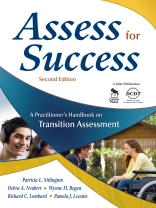’Makes a distinct contribution to the field, addressing a critical area of responsibility for schools under IDEA 2004.’
—Gary Clark, Professor of Special Education
University of Kansas
’Will become a valuable resource to many stakeholders.’
—Jeanne Repetto, Professor of Special Education
University of Florida
Help students with disabilities transition successfully into adult life!
Assisting students with disabilities in planning for their future as adults offers both challenges and unique opportunities for educators. An authoritative guidebook for Individualized Education Program (IEP) and Individualized Transition Planning teams, Assess for Success, Second Edition, helps students, special educators, and families define appropriate goals—including postsecondary education and employment choices—for the transition to adult life.
New resources in the revised edition emphasize practical transition assessment techniques with sample forms for community assessment, job analysis, and vocational training analysis. Written by a team of highly respected authors, and aligned with the reauthorization of IDEA 2004, the text discusses self-determination and career development, and demonstrates how to:
- Utilize methods for transition assessment
- Use assessment outcomes in IEP development
- Collaborate effectively with team members and other participants
- Match students to appropriate transition environments
Students with disabilities can successfully transition into adult life when they are supported by solid planning, realistic goals, and a team of caring individuals who want to ensure the best possible outcome.
Innehållsförteckning
Preface
1. Overview of Transition Assessment
2. Career Development as a Context for Transition Assessment
3. The Role of Self-Determination in the Transition Assessment Process
4. Using Outcomes of Assessment for IEP Planning
5. Roles of Key Players
6. Methods of Gathering Information
7. Matching Students to Environments: Making Transition Assessment a Success
Appendix A. Summary for Post-Secondary Living, Learning, and Working
Appendix B. Selected Commercially Available Tests/Assessment Procedures
Appendix C. Sample Community Assessment Form
Appendix D. Sample Job Analysis Form
Appendix E. Sample Vocation Training Analysis Form
Index
Om författaren
Dr. Richard C. Lombard is a Professor of Special Education at University of Wisconsin-Whitewater. He has authored or co-authored over forty articles in professional journals with an emphasis on transition assessment, vocational evaluation, community based transition models, and inclusion. Dr. Lombard served as President of the International Division on Career Development and Transition (DCDT) in 1999-2000. He currently serves as the Sweden Exchange Coordinator for UW-Whitewater and Umea University in Umea, Sweden. His international service includes work in Sweden, Australia, Nepal, India and Trinidad.











